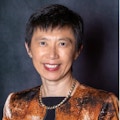Julia W.P. Hsu, Ph.D.
Professor, Erik Jonsson School of Engineering and Computer Science, University of Texas at DallasJulia W.P. Hsu’s website
Julia Hsu is a professor of materials science and engineering in the Erik Jonsson School of Engineering and Computer Science at the University of Texas at Dallas and holds the Texas Instruments Distinguished Chair in Nanoelectronics. She is an experimental materials physicist who studies materials physics phenomena using traditional approaches such as performing optimization by varying one variable at a time. In materials research, optimization is ubiquitous, but the outcomes are typically affected by a multitude of variables. Furthermore, the various input parameters have complex and nonlinear interrelationships, creating a combinatorically vast space of possible experimental conditions that cannot be exhaustively tested in practice since performing experiments is time-consuming and expensive.
Hsu’s Pivot Fellowship discipline will be machine learning, which sits at the intersection of mathematics, computer science and statistics. She aims to apply machine learning to materials synthesis and processing to guide expensive experiments to make more effective use of limited resources and to elucidate the complex interdependence among the variables. During the fellowship, Hsu will be guided under the mentorship of Tonio Buonassisi of the Massachusetts Institute of Technology and will apply machine-learning approaches to optimization problems in materials synthesis and processing, particularly energy materials.